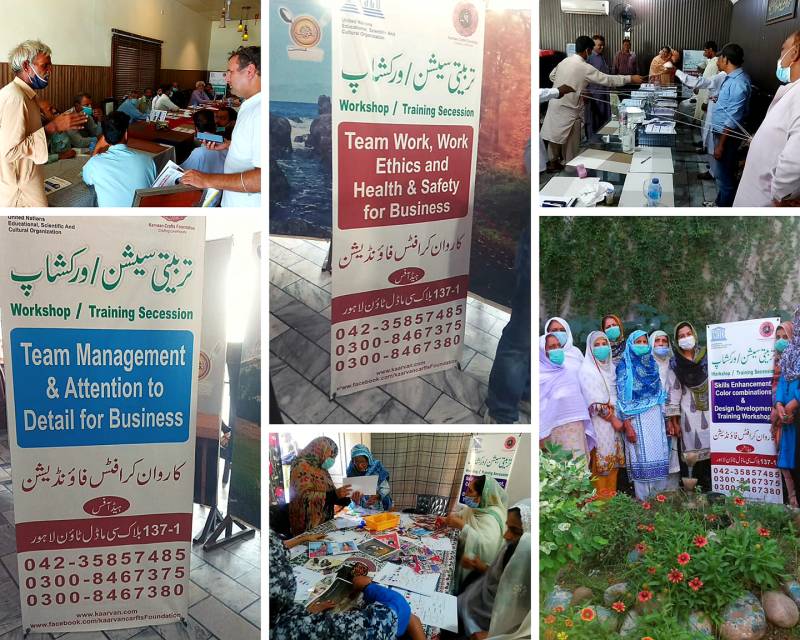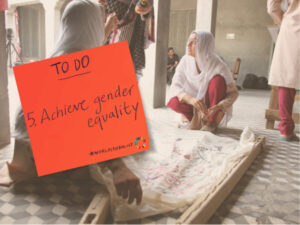
On a late autumn evening of 2004, a young and seven-months pregnant woman stood alongside her team overseeing another birth in the bustling commercial area of Lahore. She was the CEO of an organisation called Kaarvan Crafts Foundation (KCF).
KCF’s first fair-trade outlet, retailing scented, luxury candles, crafts, and home textiles produced by women in low-income communities was to open in less than twenty-four hours. Our mission was clear- to empower women in low-income communities by providing them access to upscale marketing outlets so that they could increase their incomes and improve their economic realities.
The first fair trade outlet that opened its doors to the eager bevy of clientele in October 2004 was a culmination of over five years of field work to develop pilot production centres in the most poverty-stricken villages of Punjab.
Over months and years, the team had travelled to far-flung villages, and walked door to door to mobilise village women. Some villagers allowed the staff inside, yet others feared city folk, and skeptical of scams, and more time-consuming training programs, resisted. But determined to persevere, we showed up and followed up day after day. And over months and years an incredible phenomenon had occurred.
In every village and cluster, within each group of twenty to twenty-five women, a leader emerged. She had little or no education, yet once she trusted the program, she took initiative and worked with determination and courage. Taking the lead, the rising coterie of women leaders enabled the team to organise women into groups and train them in all areas of production and quality controls.
Over the next two years, on the orbit to expansion, three more fair trade outlets were launched in Lahore, Karachi, and Islamabad. The outlets were conceived as a perfect solution to the challenges of marketing products produced by village women - or so that is what was thought.
Four years after the opening of the first outlet, the CEO took the difficult decision to shut down all the outlets with a sharp and stunning insight. The village women didn’t want to sell to one shop, they didn’t want to only sell to Lahore, Karachi, or Islamabad, they wanted access to the world markets, and they wanted direct access.
Hence, Kaarvan’s role as a cutting-edge development organisation was to provide them that access through facilitation only. In 2008, grasping the true potential of village women entrepreneurs, Kaarvan with support of MEDA or Mennonite Economic Development Associates, initiated a four-year market led, value chain development project with an aim to connect over 8000 women entrepreneurs to markets.

The impact was tremendous- rural women were eager to access entrepreneurial opportunities and markets directly, the menfolk once assured that their women were safe were supportive, and the dynamic business relationship between the highly skilled village entrepreneurs and high-end retailers, although shaky in the beginning, led to phenomenal market growth and long-term gains.
Since 2012, Kaarvan Crafts Foundation has continued to provide market-driven, skill development projects to women in low-income communities and up till now enabled over 25,000 women to access markets and promote economic development in over twenty districts and over one thousand villages. And within these communities, littered with sewage, sodden waste, and feces, a change brews. There is no electricity, running water, or even gas.
Yet along with the pesky flies and the wild laughs of half-naked straw haired children playing outside dilapidated, pest infested mud and brick huts, there spins an electric vibe, a powerful energy a relentless power. It awakens before dawn’s first copper rays light up miles of wheat fields. It cooks, cleans, and tends to the livestock and labours tirelessly till past dusk. It is the unstoppable, dynamic entrepreneurship of the village women. It is the undiluted, raw gold of Pakistan.
In 2011, three years after the first value chain development project was initiated, the Kaarvan team visited a woman leader, Parveen Baji, who had received substantial volume orders of hand embellishment from a large retailer in Lahore. Proudly, Parveen Baji, having no education but attended all of the program trainings, led the team through her courtyard sharing that she had purchased an ice cream machine from the savings of the first order so that her son, who had just cleared his matric, could run the ice-cream business over the long summer season and contribute to the household income.
In awe, the team listened to Parveen Baji as she explained how she had thought of the idea after realising that there were no ice creams shops in her village. She had also been thinking of her son’s future in a village where employment opportunities were scarce, and understood that an ice-cream enterprise would boost the sales of milk and sugar vendors in her community and help the overall local economy. She shared how she was thinking of hiring a teacher and hosting primary school classes at her house for the village children. She wanted to make sure her young daughter who attended school learnt business skills at a young age.
A key takeaway from over twenty years of working in the development sector is that women’s grassroots leadership is not based on a zero sum game but rather a win-win by which benefits, and not just economic, accrue to the family and community, and society. Hence, connecting women in low income communities to growing markets is challenging yet sustainable as it results in true development and not dependence. The only and real formula for positive and sustainable change is to make markets work for the poor so they can participate effectively and improve their economic realities.
Aysha Baqir is the founder of Kaarvan Crafts Foundation and an Ashoka Fellow.
KCF’s first fair-trade outlet, retailing scented, luxury candles, crafts, and home textiles produced by women in low-income communities was to open in less than twenty-four hours. Our mission was clear- to empower women in low-income communities by providing them access to upscale marketing outlets so that they could increase their incomes and improve their economic realities.
The first fair trade outlet that opened its doors to the eager bevy of clientele in October 2004 was a culmination of over five years of field work to develop pilot production centres in the most poverty-stricken villages of Punjab.
Over months and years, the team had travelled to far-flung villages, and walked door to door to mobilise village women. Some villagers allowed the staff inside, yet others feared city folk, and skeptical of scams, and more time-consuming training programs, resisted. But determined to persevere, we showed up and followed up day after day. And over months and years an incredible phenomenon had occurred.
In every village and cluster, within each group of twenty to twenty-five women, a leader emerged. She had little or no education, yet once she trusted the program, she took initiative and worked with determination and courage. Taking the lead, the rising coterie of women leaders enabled the team to organise women into groups and train them in all areas of production and quality controls.
Over the next two years, on the orbit to expansion, three more fair trade outlets were launched in Lahore, Karachi, and Islamabad. The outlets were conceived as a perfect solution to the challenges of marketing products produced by village women - or so that is what was thought.
Four years after the opening of the first outlet, the CEO took the difficult decision to shut down all the outlets with a sharp and stunning insight. The village women didn’t want to sell to one shop, they didn’t want to only sell to Lahore, Karachi, or Islamabad, they wanted access to the world markets, and they wanted direct access.
Hence, Kaarvan’s role as a cutting-edge development organisation was to provide them that access through facilitation only. In 2008, grasping the true potential of village women entrepreneurs, Kaarvan with support of MEDA or Mennonite Economic Development Associates, initiated a four-year market led, value chain development project with an aim to connect over 8000 women entrepreneurs to markets.

The impact was tremendous- rural women were eager to access entrepreneurial opportunities and markets directly, the menfolk once assured that their women were safe were supportive, and the dynamic business relationship between the highly skilled village entrepreneurs and high-end retailers, although shaky in the beginning, led to phenomenal market growth and long-term gains.
Since 2012, Kaarvan Crafts Foundation has continued to provide market-driven, skill development projects to women in low-income communities and up till now enabled over 25,000 women to access markets and promote economic development in over twenty districts and over one thousand villages. And within these communities, littered with sewage, sodden waste, and feces, a change brews. There is no electricity, running water, or even gas.
Yet along with the pesky flies and the wild laughs of half-naked straw haired children playing outside dilapidated, pest infested mud and brick huts, there spins an electric vibe, a powerful energy a relentless power. It awakens before dawn’s first copper rays light up miles of wheat fields. It cooks, cleans, and tends to the livestock and labours tirelessly till past dusk. It is the unstoppable, dynamic entrepreneurship of the village women. It is the undiluted, raw gold of Pakistan.
In 2011, three years after the first value chain development project was initiated, the Kaarvan team visited a woman leader, Parveen Baji, who had received substantial volume orders of hand embellishment from a large retailer in Lahore. Proudly, Parveen Baji, having no education but attended all of the program trainings, led the team through her courtyard sharing that she had purchased an ice cream machine from the savings of the first order so that her son, who had just cleared his matric, could run the ice-cream business over the long summer season and contribute to the household income.
In awe, the team listened to Parveen Baji as she explained how she had thought of the idea after realising that there were no ice creams shops in her village. She had also been thinking of her son’s future in a village where employment opportunities were scarce, and understood that an ice-cream enterprise would boost the sales of milk and sugar vendors in her community and help the overall local economy. She shared how she was thinking of hiring a teacher and hosting primary school classes at her house for the village children. She wanted to make sure her young daughter who attended school learnt business skills at a young age.
A key takeaway from over twenty years of working in the development sector is that women’s grassroots leadership is not based on a zero sum game but rather a win-win by which benefits, and not just economic, accrue to the family and community, and society. Hence, connecting women in low income communities to growing markets is challenging yet sustainable as it results in true development and not dependence. The only and real formula for positive and sustainable change is to make markets work for the poor so they can participate effectively and improve their economic realities.
Aysha Baqir is the founder of Kaarvan Crafts Foundation and an Ashoka Fellow.

